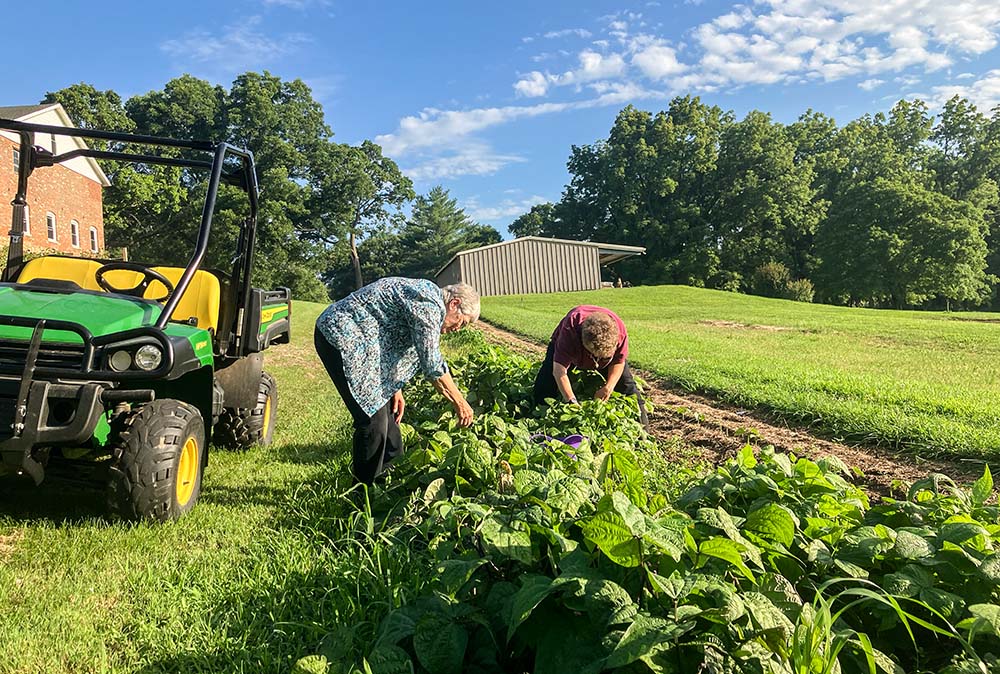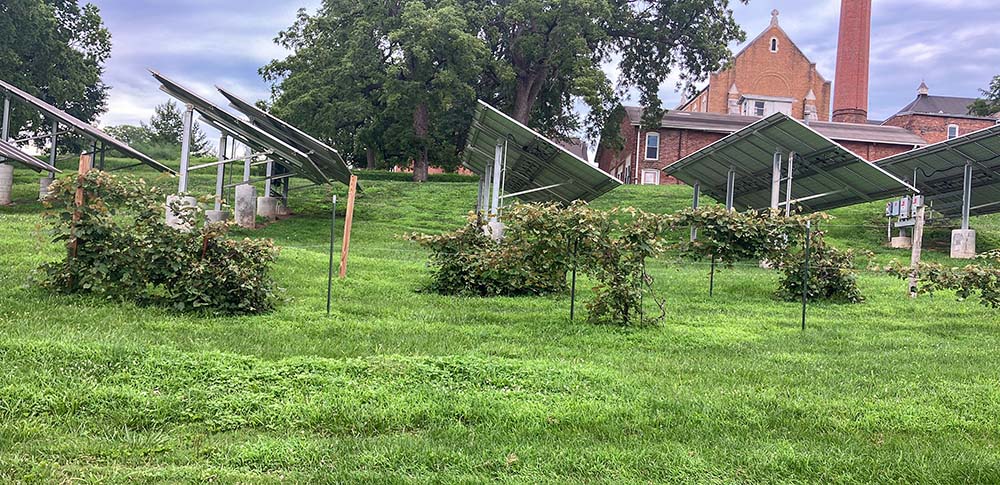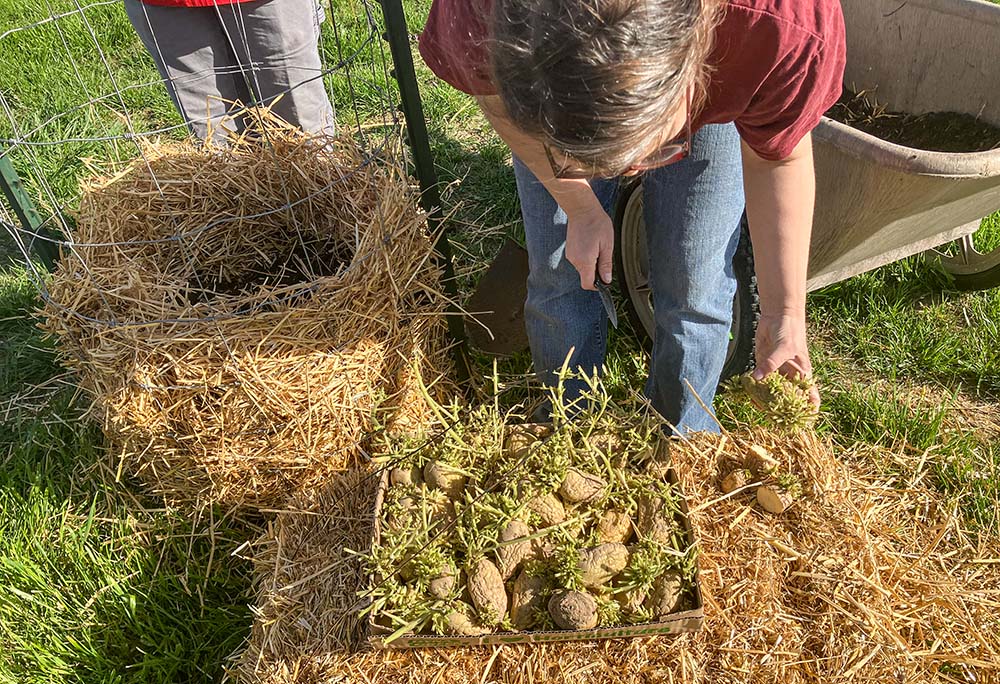
Benedictine Srs. Helen Mueting, left, and Barbara Smith harvest green beans from the Benedictine Sisters' garden in Atchison, Kansas, during the summer of 2024. (Courtesy of the Benedictine Sisters of Mount St. Scholastica)
As I look at creation around me, I can easily be caught up in the groaning of its pains and its bondage to decay. I see the Earth's shores littered with the wastes of our consumer lives: plastic bottles, cups and other containers; discarded clothes; piles of electronic trash; dying sea life; and countries suffering from drought, floods, hurricanes and other natural disasters. Many people must rely on bottled water for their survival or travel great distances to find water they can drink. Nations fight against one another for economic and territorial gain.
Seeing all this, I can become depressed and want to just give up. Why fight a losing battle? Why keep preaching to deaf ears? Is liberation even possible?
The theme for 2024's World Day of Prayer for the Care of Creation — "Hope and Act for Creation" — invites us to consider a different response. Inspired by Paul's Letter to the Romans, it calls us to reflect on his words:
For the creation was subjected to frustration, not by its own choice, but by the will of the one who subjected it, in hope that creation itself will be liberated from its bondage to decay and brought into the freedom and glory of the children of God. We know that creation has been groaning as in the pains of childbirth right up to the present time (Romans 8:20-22, NIV).
Recently, I watched a documentary titled "Buy Now!: The Shopping Conspiracy." The movie was an eye-opener and rather depressing. Its main message is that companies deliberately manipulate us into buying what we don't need and make sure that nothing lasts too long so that we continue to buy.
One question the documentary raises is what happens to all those things we buy once we throw or give them away? Where is away? There is no away except here in our world. What do we do with away when it begins to encroach on our world? When it is no longer in Third World countries where we can't see it?
Recycling is not solving the problem. Only about 10% of the plastic we use is ever recycled. Yet, we keep manufacturing it and using it for multiple products.
Where is the hope for creation? When will a new birth take place?

Solar panels on the Benedictine Sisters of Mount St. Scholastica campus in Atchison, Kansas, supply approximately 30% of the energy for one building and 5% of the total campus. (Courtesy of the Benedictine Sisters of Mount St. Scholastica)
It will never take place unless each of us does what little we can. I have been a member of a committee in our community that is dedicated to ecology and care of creation. The committee, named Wangari Committee after Kenyan environmental activist Wangari Maathai, was started 10 years ago to help allocate money from a donation given to my community for the purpose of educating and working with college and high school students and our community in the area of ecology.
In the beginning, the money was used primarily to educate students, particularly on Pope Francis' environmental encyclical, "Laudato Si', on Care for Our Common Home." Since then, we have used some of the funds to help sponsor Discovery Day projects at the local college that address stewardship, sustainability, women's issues and social justice.
Besides sponsoring these projects, we have also addressed issues within our religious community. We continue to educate our community on environmentally friendly products and produce, the need for alternatives to plastic use and fossil fuels, the importance of biodiversity in our environment, and integral ecology. We have shown a number of documentaries that have addressed climate issues.
Have we readily been accepted? Have we received full support for our endeavors? The answer is definitely no. Some saw us as alarmists, making a big deal out of things that have always been. They felt we have used our water for years and eaten the same food and are OK. Often, they prefer the convenience of plastic or paper products.
Many times, I just want to throw in the towel and call it quits. Why go through all the effort when no one really cares or believes us?
Advertisement
Even the high school students who were so eager and receptive when we gave our first presentation to them and taught Laudato Si' in their religion classes for one day have since stopped working on the initiatives they began with our help. Their greenhouse seems to no longer be used. Part of this is due to new administrators and new faculty who have not had input on Laudato Si' and have not been receptive to Francis' call to all of us to work together for creation.
We keep trying, however, and adjusting our expectations. In the last few years, the community attitude has changed. More sisters have read Laudato Si' and Francis' apostolic exhortation Laudate Deum; more have watched climate-related documentaries; and more have followed the latest stories on how climate change is affecting our world.
We have revised our community's mission statement to say, "Our mission is to seek God through community life, prayer, ministry, and care for all creation." We have joined the Laudato Si' Action Platform and have aligned what we do with its seven goals.
Two of the goals — community engagement and ecological education — have inspired new initiatives. This past spring, we worked with other members of our local community to begin a community garden on our property. One of our sisters built 10 raised beds, with the help of volunteers. We planted tomatoes, peppers, okra, green beans and lettuce, along with building four potato towers.

Courtney King, a Merrywood Community Garden board member, works on building one of four potato towers. (Courtesy of the Benedictine Sisters of Mount St. Scholastica)
Volunteers watered and harvested the produce, which was then given to our local Catholic Charity. We were able to contribute almost 1,000 pounds of produce.
We have also provided education on gardening and most recently on creating bioreactors for producing biochar to be used to add nutrients to our soil. In the process, we have engaged the help of our local community in Atchison, Kansas. People have contributed not only service in the garden but also donations of seeds, plants, dirt, a hoop house, and money. Next year, our hope is to enlarge the garden.
To a small degree, we are acting with hope for creation, and we have seen some progress. Our community is at least open to changes, and more sisters are making small efforts for creation. The local Atchison community is excited about the garden and hopes to expand it next spring. In the process, we are also working more with the local community and getting to know them better.
We haven't given up on the high school or college students either. We have offered some internships for college students to help with gardening and creating a pollinator garden. We have reached out again to the local high school president to see what we can do in the school.
Hopefully, all our efforts will enable many small efforts to make our world more sustainable. As we hope and act for creation, we will lead the way for others to do so also.






